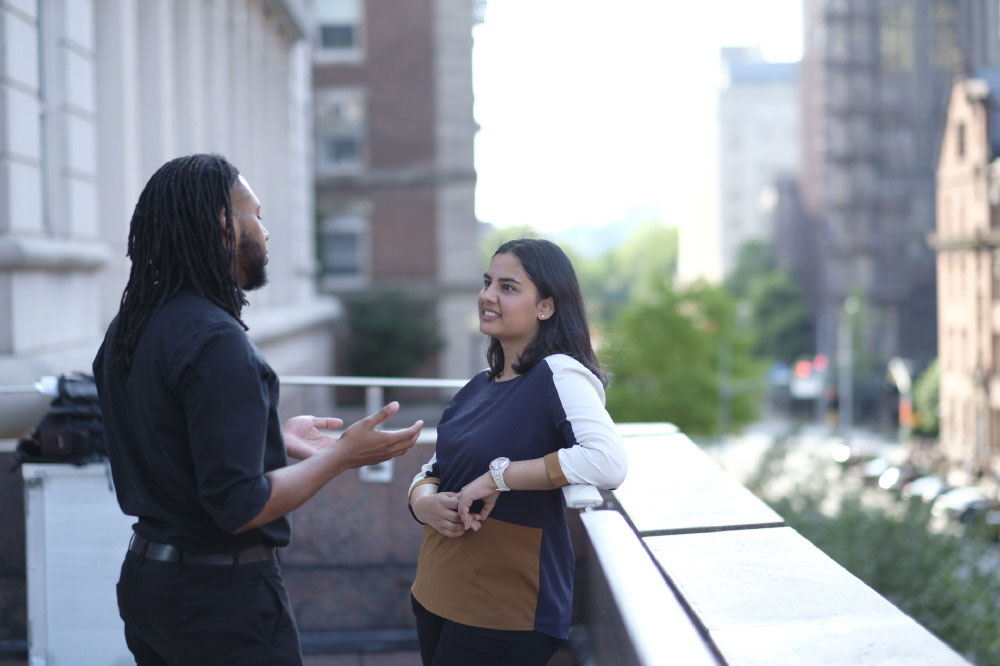Master of Education in Counseling Psychology
Mental Health Counseling Track with Bilingual Concentration
The Bilingual Latina/o Mental Health (BLMH) concentration within the Ed.M. program is the only program in New York to offer culturally appropriate training in delivering mental health services in Spanish to Latinas/os. The BLMH concentration will train bilingual students with intermediary Spanish fluency to be bicultural/bilingual counselors and counseling psychologists with the necessary competencies needed to understand and provide culturally responsive care to Spanish-dominant and bilingual multi-racial Latina/o clients. Students will take courses concurrently within the required Ed.M. or Ph.D. curriculum coursework. All courses within the BLMH will be taught by bilingual faculty. Additionally, students will be supervised by a bilingual supervisor at his/her fieldwork training site.
Mission and Goals
The concentration in BLMH aspires to train students to become bilingual and bicultural mental health providers proficient to treat the Latina/o population by:
- Gaining understanding of the demographic and cultural make-up of Latina/o population
- Increasing knowledge of psychosocial factors that impact the Latina/o population
- Learning to effectively assess the varied psychological needs and expressions of distress of the Latina/o client
- Gaining the counseling skills needed to provide mental health services in Spanish
- Acquiring the knowledge of Spanish therapeutic concepts, interventions, and terminology
- Learning to apply intervention models (strategies, and techniques) to treatment of Latinas/os.
Ed.M. Program Highlights
The Ed.M. in Mental Health Counseling prepares students to practice mental health counseling. Our program is dedicated to the preparation of professionals who 1) facilitate the optimal development of individuals, groups, and organizations through 2) strategies of prevention, intervention, and remediation that are 3) culturally-relevant and psychologically-appropriate across the lifespan.
In-depth infusion of racial-cultural and social justice emphases throughout program components. Although our curriculum features certain courses with words like "multicultural" in the titles, our multicultural-social justice instruction does not reside in just those courses. Rather, we conceptualize every course and program experience within the context of a social justice and racial-cultural framework. Not only is this orientation consonant with our belief that socially-just practice is ethical, effective practice, it also allows us to align our work with broader movement toward social equity.
A commitment to the crucial role of experiential training and self-awareness within the best counselor preparation. As a counselor or therapist, the instrument that you use to enact your professional work is you -- so the more aware you are of your own interpersonal style, skills, and biases, the more effectively you can use your instrument. Many students find that some of the most important, challenging, and transformational aspects of their TC training results from courses like Foundations, Group Counseling, and Racial-Cultural Counseling Lab, where students learn about themselves as they learn about the practice of counseling.
Research exposure and opportunities. As a license-eligible Ed.M. program, our first priority is to train caring, ethical, effective practitioners -- yet, at Teachers College, you have the opportunity to get first-rate practitioner preparation in the context of first-rate scholarship. Our faculty includes researchers whose work has shaped the counseling profession, and every faculty member maintains ongoing research teams to which students at any level of training may apply. To find out more about our faculty's research interests, please consult their individual pages on the TC website.
Our students are prepared to work in a variety of settings, including those that emphasize health (e.g., outpatient clinics, hospitals, nursing homes). Graduates will be able to apply their skills in clinical practice, administration, assessment, and research as well as to produce knowledge, to be leaders in policy development and implementation, and to work in independent practice.
With the help of a faculty advisor, students register for required and elective courses relevant to their needs and career objectives. Depending on their areas of interest and levels of training, graduates have found employment in colleges, adult education centers, hospitals, clinics, health centers, and community and government agencies. Many of our students also go on to study at the doctoral level.
To learn more about licensure requirements, please visit the New York State Education Department's Office of the Professions. If you are interested in eventually obtaining licensure in another state, you will need to research that state's requirements. View our Mental Health Counseling Program Data.

Admission Information
Displaying requirements for the Spring 2025, Summer 2025, and Fall 2025 terms.
Master of Education
- Points/Credits: 60
- Entry Terms: Fall
- Enrollment Formats: Full-Time Campus-Based
Certification
View Public Disclosure Notification
- NY State Licensure: Mental Health Counseling
Application Deadlines
| Entry Term Available | Priority Deadlines | Final Deadlines | Extended Deadlines |
|---|---|---|---|
| Spring | N/A | N/A | N/A |
| Summer | N/A | N/A | N/A |
| Fall | January 15, 2025 | January 15, 2025 | N/A |
Select programs remain open beyond our standard application deadlines, such as those with an extended deadline or those that are rolling (open until June or July). If your program is rolling or has an extended deadline indicated above, applications are reviewed as they are received and on a space-available basis. We recommend you complete your application as soon as possible as these programs can close earlier if full capacity has been met.
Application Requirements
| Requirement | |
|---|---|
| Online Degree Application, including Statement of Purpose and Resume | |
| Transcripts and/or Course-by-Course Evaluations for all Undergraduate/Graduate Coursework Completed | |
| Results from an accepted English Proficiency Exam (if applicable) | |
| $75 Application Fee | |
| Two (2) Letters of Recommendation | |
| Supplemental application required (included in online application) |
For admission-related inquiries, please contact CCPadmission@tc.columbia.edu.
Degree Requirements
Please contact the program for more information on course requirements.